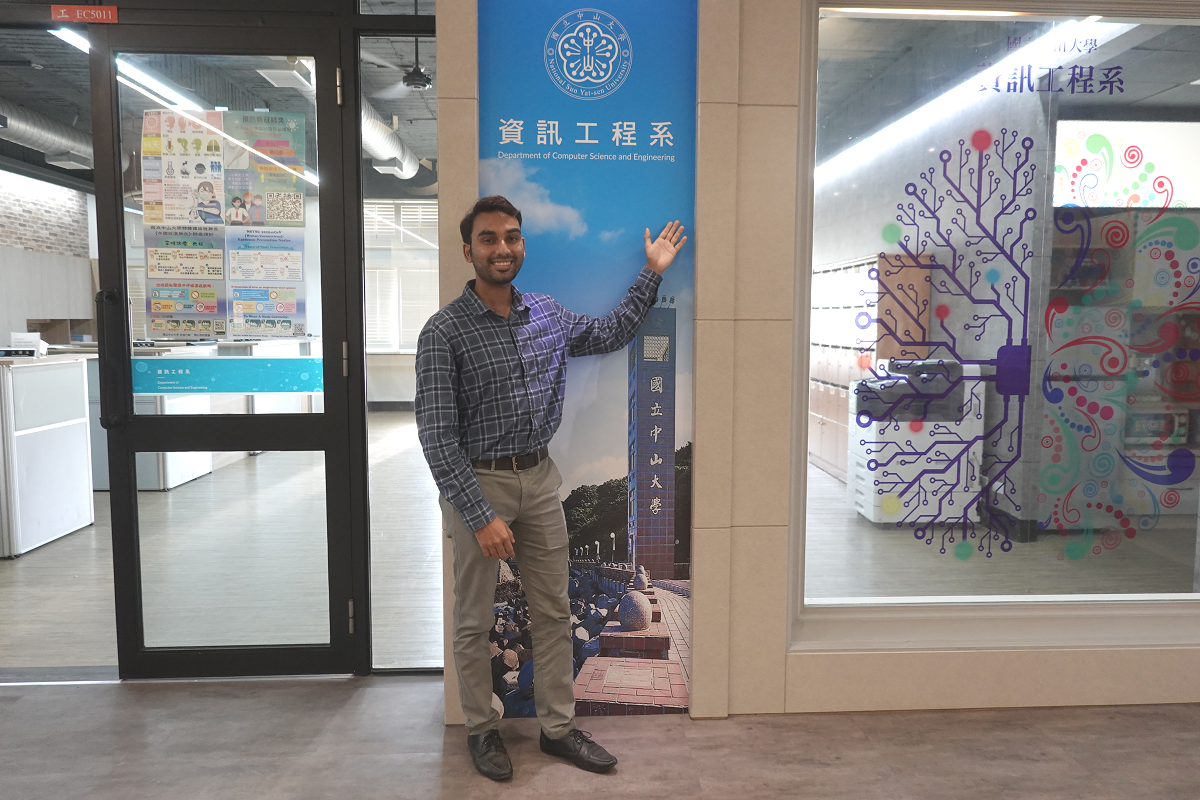Assistant Professor Arijit Karati defends users’ security and privacy with cryptographic algorithms


2021-06-07
“Taiwan’s strong point is its technologies, and as they are going through digitalization, there is more and more emphasis on cybersecurity issues,” says Assistant Professor Arijit Karati of NSYSU Department of Computer Science and Engineering (DCSE). According to a recent report by Taipei Times, “at least 900 cybersecurity positions would need to be filled at various central and local government agencies in Taiwan,” and the Executive Yuan is planning to establish the Ministry of Digital Development next year.
To meet Taiwan’s need for cybersecurity professionals, NSYSU has recently launched a Master’s and Ph.D. Program in Information Security and is gradually expanding the program’s course offer. One of the program faculty members is Professor Karati, who joined the faculty of NSYSU only last year (2020) and specializes in applied cryptology – the use of mathematics and analysis for information security. He is committed to developing cybersecurity teaching and research at the University and attracting more students to work in this field. Besides national collaborations, this year, he plans to establish a laboratory specializing in cryptography, attract outstanding international students and build strong partnerships with overseas institutions to jointly work on projects relating to blockchain technology, federated learning, and post-quantum cryptography. For his outstanding solutions to the unlimited challenges to security and privacy in digital systems, Professor Karati was awarded MOST 2019 Postdoctoral Researcher Academic Research Award and became an IEEE (Institute of Electrical and Electronics Engineers) Senior Member last year.
The contemporary Internet architecture has several unsolved problems in users’ data security – content security, content caching, and administration complexity. Therefore, computer scientists are working on Named Data Networking (NDN), a proposed construction for the Future Internet. Professor Karati, together with Professor Chun-I Fan and Master’s student Pei-Shan Yang of DCSE, was the first to make an effort to achieve the content producer’s anonymity in the NDN with minimal overheads by proposing a multi-receiver secure data transmission protocol that also lowers the storage costs.
Another security concern is accessing data clouds, especially with the rapid growth of the Internet of Things (IoT) in a wide range of services, such as healthcare, smart electricity grids, or smart cities, which means that client devices remotely access cloud-assisted cyber-physical systems. The number and the diversity of devices connected to cloud environments challenge secure and efficient file storage and sharing. Recently, with his international research team, Professor Karati came up with a lightweight identity-based authenticated data sharing protocol to provide secure data sharing among geographically dispersed physical devices and efficient access to data for clients. In addition, he made an effort to design a lattice-based authentication and access control (LAAC) protocol last year to address the vulnerability of IoT-enabled e-health systems to quantum attacks and solve the security and privacy challenges such systems pose.
Computer scientists are continually working on improving the security of cyberspace. Nevertheless, what can we do to protect our data on the Internet? “First, determine which devices are trustworthy – your phone, home PC, office computer – and access your data through them,” advises Professor Karati. “Do not focus only on what you can see on the screen; rather, try to check what is behind it.” Confirm whether the website is using secure data transfer protocols, monitor your login notifications, and limit the number of providers whose applications you are using, he recommended.
Articles for reference:
Reliable file transfer protocol with producer anonymity for Named Data Networking
https://www.sciencedirect.com/science/article/pii/S2214212621000843
Provably Secure and Lightweight Identity-Based Authenticated Data Sharing Protocol for Cyber-Physical Cloud Environment
https://ieeexplore.ieee.org/document/8355956/
LAAC: Lightweight Lattice-Based Authentication and Access Control Protocol for E-Health Systems in IoT Environments
https://ieeexplore.ieee.org/stamp/stamp.jsp?arnumber=9201110
“Taiwan’s strong point is its technologies, and as they are going through digitalization, there is more and more emphasis on cybersecurity issues,” says Assistant Professor Arijit Karati of NSYSU Department of Computer Science and Engineering (DCSE). According to a recent report by Taipei Times, “at least 900 cybersecurity positions would need to be filled at various central and local government agencies in Taiwan,” and the Executive Yuan is planning to establish the Ministry of Digital Development next year.
To meet Taiwan’s need for cybersecurity professionals, NSYSU has recently launched a Master’s and Ph.D. Program in Information Security and is gradually expanding the program’s course offer. One of the program faculty members is Professor Karati, who joined the faculty of NSYSU only last year (2020) and specializes in applied cryptology – the use of mathematics and analysis for information security. He is committed to developing cybersecurity teaching and research at the University and attracting more students to work in this field. Besides national collaborations, this year, he plans to establish a laboratory specializing in cryptography, attract outstanding international students and build strong partnerships with overseas institutions to jointly work on projects relating to blockchain technology, federated learning, and post-quantum cryptography. For his outstanding solutions to the unlimited challenges to security and privacy in digital systems, Professor Karati was awarded MOST 2019 Postdoctoral Researcher Academic Research Award and became an IEEE (Institute of Electrical and Electronics Engineers) Senior Member last year.
The contemporary Internet architecture has several unsolved problems in users’ data security – content security, content caching, and administration complexity. Therefore, computer scientists are working on Named Data Networking (NDN), a proposed construction for the Future Internet. Professor Karati, together with Professor Chun-I Fan and Master’s student Pei-Shan Yang of DCSE, was the first to make an effort to achieve the content producer’s anonymity in the NDN with minimal overheads by proposing a multi-receiver secure data transmission protocol that also lowers the storage costs.
Another security concern is accessing data clouds, especially with the rapid growth of the Internet of Things (IoT) in a wide range of services, such as healthcare, smart electricity grids, or smart cities, which means that client devices remotely access cloud-assisted cyber-physical systems. The number and the diversity of devices connected to cloud environments challenge secure and efficient file storage and sharing. Recently, with his international research team, Professor Karati came up with a lightweight identity-based authenticated data sharing protocol to provide secure data sharing among geographically dispersed physical devices and efficient access to data for clients. In addition, he made an effort to design a lattice-based authentication and access control (LAAC) protocol last year to address the vulnerability of IoT-enabled e-health systems to quantum attacks and solve the security and privacy challenges such systems pose.
Computer scientists are continually working on improving the security of cyberspace. Nevertheless, what can we do to protect our data on the Internet? “First, determine which devices are trustworthy – your phone, home PC, office computer – and access your data through them,” advises Professor Karati. “Do not focus only on what you can see on the screen; rather, try to check what is behind it.” Confirm whether the website is using secure data transfer protocols, monitor your login notifications, and limit the number of providers whose applications you are using, he recommended.
Articles for reference:
Reliable file transfer protocol with producer anonymity for Named Data Networking
https://www.sciencedirect.com/science/article/pii/S2214212621000843
Provably Secure and Lightweight Identity-Based Authenticated Data Sharing Protocol for Cyber-Physical Cloud Environment
https://ieeexplore.ieee.org/document/8355956/
LAAC: Lightweight Lattice-Based Authentication and Access Control Protocol for E-Health Systems in IoT Environments
https://ieeexplore.ieee.org/stamp/stamp.jsp?arnumber=9201110
Click Num:
Share
